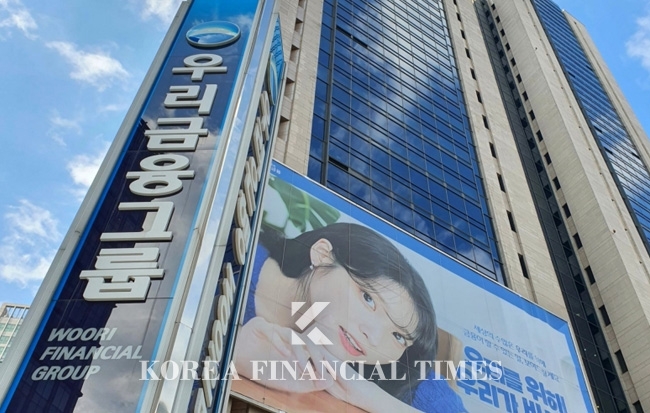According to financial media, questions during Woori's conference call to announce its first-half results on July 26 focused on valuation and portfolio strategy.
Regarding the value-up program, CFO Lee, Vice President and Chief Financial Officer of Woori Financial, said, “Further improvement of the common equity ratio will be possible if the exchange rate, which has been surging due to the recent strong dollar, stabilizes.” “Regarding shareholder return, we have elaborated a shareholder policy based on the common equity ratio, targeting a medium- to long-term total shareholder return rate of 50%.”
“Within the 40% total shareholder return ratio, we will pay out 30% cash dividends, and any excess dividends will be fully repurchased and burned,” said CFO Lee. ”Once we exceed the 40% total shareholder return ratio, we will increase our cash dividend and share repurchase policy in a balanced manner.”
“Woori Financial's dividend yield is at an all-time high,” said CFO Lee, ”and if we gradually expand the total shareholder return ratio, our shareholder value will be further enhanced beyond the level of our competitors.”
The market has responded favorably to Woori's shareholder return policy. On the 26th, Woori's stock price rose more than 8% intraday, setting a new 52-week high. Compared to the 3-4% rise in banking stocks on the same day, investors flocked to Woori Financial.
“We are not considering acquiring any additional assets outside of our securities.”
CFO Lee also assessed Woori Securities as having “its own growth potential”.“What I can say clearly in the M&A process is that Woori Financial will not overpay,” Lee emphasized, ”and we are not considering a capital increase, which investors are worried about in relation to our current expansion into the insurance industry.” This is a blind eye to the capital increase that investors are concerned about, as Woori Financial's stock price is undervalued more than its competitors due to market concerns about capital increase.
CFO Lee said the company is only focusing on the ongoing mergers and acquisitions of securities firms and insurers and is not considering any additional M&A in the short term. “In the case of merged securities companies, the assets held are not large and there is little impact on the capital ratio,” he said, adding, ”We will focus on our own growth for the time being (to grow) into a securities company strong in digital and IB.”
According to CFO Lee, the BIS calculations apply 250 percent of the investment amount as risk-weighted assets until the group's common equity capital ratio is within 10 percent, so acquiring a financial company will have a limited impact on the group's overall capital ratio. “If we acquire an insurance company without a capital increase, it will improve our return on equity (ROE) by increasing net income at the group level and help us return to shareholders,” he said.
“We are currently conducting due diligence on Dongyang Life and have no plans to acquire any additional insurers (besides Dongyang Life) in the near future,” he said.
Lee Yongwoo(lee@fntimes.com)
가장 핫한 경제 소식! 한국금융신문의 ‘추천뉴스’를 받아보세요~
데일리 금융경제뉴스 Copyright ⓒ 한국금융신문 & FNTIMES.com
저작권법에 의거 상업적 목적의 무단 전재, 복사, 배포 금지












![이환주號 국민은행 ‘캄보디아·인니ʼ 기업금융 공략 가속 [은행권 2026 글로벌 전략]](https://cfnimage.commutil.kr/phpwas/restmb_setimgmake.php?pp=006&w=284&h=214&m=5&simg=2026020100373304670dd55077bc211821821443.jpg&nmt=18)

![양종희號 KB금융, 소상공인 육성 방점…5년간 17조 쏜다 [2026 포용금융 대전환]](https://cfnimage.commutil.kr/phpwas/restmb_setimgmake.php?pp=006&w=284&h=214&m=5&simg=2026012510034204479dd55077bc25812315153.jpg&nmt=18)
![‘순익 4조 돌파 전망’ 함영주號 하나금융, IB·WM 강화 예고 [2025 금융지주 실적]](https://cfnimage.commutil.kr/phpwas/restmb_setimgmake.php?pp=006&w=284&h=214&m=5&simg=2026011801511100222dd55077bc25812315214.jpg&nmt=18)
!['따로 또 같이' 디지털자산 동맹···임종룡 우리금융 회장의 선택은 [디지털자산 지형도]](https://cfnimage.commutil.kr/phpwas/restmb_setimgmake.php?pp=006&w=284&h=214&m=5&simg=2026020307355101854b4a7c6999c121131189150.jpg&nmt=18)
![함영주號 하나금융, RWA 상승률 3.5% 우수, 순익 '4조'··아쉬운 '비은행' [금융사 2025 연간 실적]](https://cfnimage.commutil.kr/phpwas/restmb_setimgmake.php?pp=006&w=284&h=214&m=5&simg=2026013119503707574b4a7c6999c121131189150.jpg&nmt=18)
![정상혁號 신한은행, 일본·베트남 이을 새 영토 ‘우즈벡ʼ 주목 [은행권 2026 글로벌 전략]](https://cfnimage.commutil.kr/phpwas/restmb_setimgmake.php?pp=006&w=284&h=214&m=5&simg=2026020100420708679dd55077bc211821821443.jpg&nmt=18)
![정진완號 우리은행, 글로벌그룹 '환골탈태'…美·베트남 '집중' [은행권 2026 글로벌 전략]](https://cfnimage.commutil.kr/phpwas/restmb_setimgmake.php?pp=006&w=284&h=214&m=5&simg=2026020100195109323dd55077bc211821821443.jpg&nmt=18)
![12개월 최고 연 3.20%…SC제일은행 'e-그린세이브예금' [이주의 은행 예금금리-2월 1주]](https://cfnimage.commutil.kr/phpwas/restmb_setimgmake.php?pp=006&w=110&h=79&m=5&simg=20260130181142061535e6e69892f18396169112.jpg&nmt=18)
![정진완號 우리은행, 글로벌그룹 '환골탈태'…美·베트남 '집중' [은행권 2026 글로벌 전략]](https://cfnimage.commutil.kr/phpwas/restmb_setimgmake.php?pp=006&w=110&h=79&m=5&simg=2026020100195109323dd55077bc211821821443.jpg&nmt=18)
![24개월 최고 연 2.90%…부산은행 '더 특판 정기예금' [이주의 은행 예금금리-2월 1주]](https://cfnimage.commutil.kr/phpwas/restmb_setimgmake.php?pp=006&w=110&h=79&m=5&simg=20260130181253004825e6e69892f18396169112.jpg&nmt=18)
![박춘원號 전북은행, 포트폴리오 고도화 주문…기업·투자금융 명가 재건 [금융사 2026 상반기 경영전략]](https://cfnimage.commutil.kr/phpwas/restmb_setimgmake.php?pp=006&w=110&h=79&m=5&simg=20251231101842098005e6e69892f222110224119.jpg&nmt=18)
!['따로 또 같이' 디지털자산 동맹···임종룡 우리금융 회장의 선택은 [디지털자산 지형도]](https://cfnimage.commutil.kr/phpwas/restmb_setimgmake.php?pp=006&w=110&h=79&m=5&simg=2026020307355101854b4a7c6999c121131189150.jpg&nmt=18)